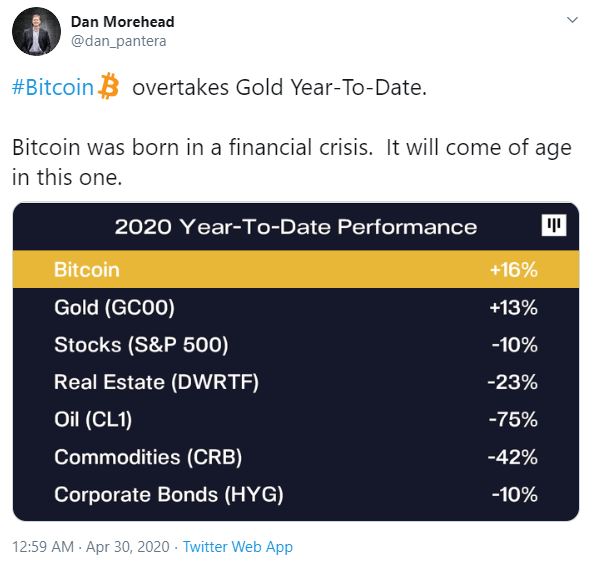What are your financial beliefs?
What are the principles that you operate by when deciding what to do with your wealth?
Do you like to play the defensive, conservative game? Allocating your assets in such a way to try and protect them in markets like we’ve seen over the last few weeks?
Or are you more aggressive? Keen to take on and accept risk, yet open to the threat of seeing quite dramatic capital falls in times of crisis?
Or are you a mix of both?
Whichever way you lean, what are the asset classes you would say are your ‘go-to’ asset classes?
Are you all about stocks? Maybe a property lover? Maybe you just want to stick with the good old stable cash and fixed interest accounts?
Or maybe you’re a gold bug. You want that as a part of the mix to protect against crisis and to diversify the portfolio.
Again, it doesn’t matter which of the traditional asset classes you’re into. They all serve a purpose. And the smart investor typically doesn’t go all-in on any one asset class. You should mix and match according to your stage in life, your appetite for risk, and what you want to financially achieve in life.
[conversion type=”in_post”]
Is it gold?
If you’ve been in the investment game for a while, then you may have also dabbled in things like hybrid securities (the big banks love these), contracts for difference (CFDs), maybe a bit of spread betting, foreign exchange trading, options, warrants, and all the different kinds of derivatives known to mankind.
To most people, many of those terms in the last paragraph are absolute gobbledygook.
But the financial system that we know and are supposed to trust has created all these complex financial instruments over the years. And to the semi-savvy investor, these are all legitimate ways to work the market.
They are all also relatively new. Yet because they were created by the financial institutions where we keep our money, most people blindly trust their legitimacy.
What I find incredibly interesting then, is the near instantaneous dismissal of an asset class that is also new, but is simple, easy to access and use, and importantly is proving to be the best hedge in a financial crisis you can own.
If you can accept that hybrid securities, options, warrants, and other financial derivatives can work in a portfolio, then you must also accept this new asset. If you invest in property, fixed interest, cash, or stocks, then you must accept this asset.
When you want to hold an asset that could deliver protection against a market crash, there is one asset that so far outperforms everything else.
And it’s not gold.
Earlier today Dan Morehead, CEO of Pantera Capital, one of the world’s leading digital asset venture funds, tweeted about some of the current 2020 year-to-date performances of different assets and asset classes.
|
|
|
Source: Twitter |
The best performing asset you could have held in 2020 so far is bitcoin.
Can you call yourself a real investor?
At the time of his tweet, Bitcoin was 16% higher year-to-date. That’s more than gold, and miles more than stocks, real estate, corporate bonds, commodities — and a different universe to oil.
If you want to hold an asset in a time of crisis, bitcoin — in my opinion — looks like the one you want to have.
Now, maybe you do already. And that’s great. But I know there’s a good chance you don’t. I hope I’m wrong, but I know that traditional investors still think of it as magical internet money. They claim it’s not backed by anything and is simply a byproduct of the greater fool theory.
Yet these are often the same investors who rave on about gold, the benefits of cash, stocks, options, currencies, and all the other traditional investment classes.
Their views and visions are biased by their unwillingness to accept that something new can come about and be an alternative to the fractured and destabilised financial system we’re all so used to.
We all see these investors refusing to accept the potential of bitcoin. The big names in finance, Buffett, Dalio, Schiff, etc. They’ve made their dough in a market tilted in their favour, so to be fair why should they care.
Well sadly, a lot of non-billionaire and non-millionaire investors still think what these guys say is gospel. But we live in a world where they aren’t the savants that you might think of them as.
The core matter at hand is the very design and creation of bitcoin was as the antithesis to the traditional financial system.
It spawned from the 2008/09 crisis and has not had a true test of its purpose until now.
And it’s doing exactly what it was supposed to do. It has not been manipulated by a centralised authority. More have not been created to appease the markets. Its code hasn’t changed and in a time of financial crisis it’s not only held up its end of the bargain, but delivered upside to those who held it.
If you learn anything from this crisis, it’s that bitcoin must be taken seriously by traditional investors who’ve dismissed it. You don’t have to go all-in, nor should you. But if you’ve got a slice of the action now, hold on tight.
It’s about to get wild as those who dismissed it come in their droves.
Responsible, prudent portfolio management and smart investment decision-making now demand at the very least investors looking at an allocation to bitcoin as part of a strategy. This crisis has shown that it can be a legitimate alternative to the traditional system.
Those who can’t see that, who need more proof than what they’re getting right now, I wonder if they can even call themselves real investors?
Regards,
Sam Volkering,
Editor, Money Morning
PS: Check out the Bitcoin buyer’s guide — everything you need to know to buy your first bitcoin today. Download your free guide now.


